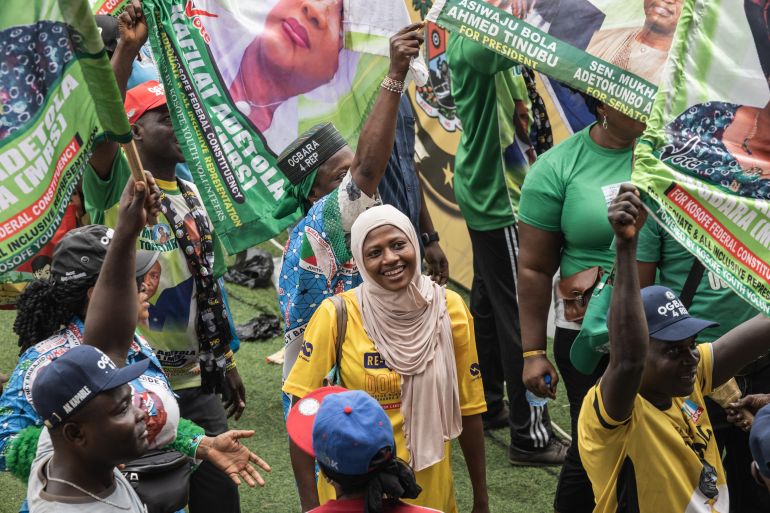Voters, observers hopeful as Nigeria presidential election begins
Eighteen candidates are jostling to succeed Muhammadu Buhari as president but only four are frontrunners in the race.

Elections for the Nigerian presidency and both houses of the federal parliament are being held across the country’s 36 states, in what is set to be the sixth successive civilian-to-civilian transition of power since a return to democracy in 1999.
Eighteen candidates are jostling to succeed Muhammadu Buhari, who steps down as president in May, having served out two four-year terms. But only four are considered frontrunners: Bola Tinubu of the ruling All Progressives Congress (APC), Atiku Abubakar of the leading opposition People’s Democratic Party, Peter Obi of the Labour Party, and Rabiu Kwankwaso of the New Nigeria People’s Party (NNPP).
Keep reading
list of 4 itemsExplainer: Key voting blocs ahead of Nigeria election
Nigerian MP arrested with nearly $500,000 in cash before election
Obi supporters in home state have high hopes for Nigeria election
The polls open at 07:30 GMT and are expected to close at 13:30 GMT.
“Saturday will be the continent’s largest democratic exercise and one of the largest in the world,” said Stacey Abrams, co-leader of the National Democratic Institute and International Republican Institute election mission to Nigeria.
“What happens this weekend will have wide-ranging impacts across the globe,” Abrams, a former US Congress minority leader, told Al Jazeera on Friday.
Key issues at stake include the economy, which has suffered two recessions in four years, and security.
Ahead of Saturday’s vote, cash and fuel shortages have been a trending topic nationwide. Insecurity – which the outgoing president had promised to tackle in his election campaigns – remains a serious issue as multiple armed groups continue crusades of terror across at least four of Nigeria’s six geopolitical zones.
More than a third of the total eligible voters in Nigeria – where the median age is 18 – are youths and their voices are expected to make a difference after years of low turnout.
In Onitsha, the commercial hub of the country’s southeast and birthplace of candidate Peter Obi, Ginikachukwu Okafor said she was excited to vote in an election that, for her, should kick-start a new era for Nigeria.
“Our country, Nigeria, is beautiful but our leaders don’t know how to lead,” the 33-year-old smartphone vendor told Al Jazeera in the city’s market, one of the biggest in West Africa.
“If Nigeria was good, our brothers and sisters won’t be going to other countries to carry drugs. It is not supposed to be so. We have to come out in numbers … to vote for our brother Peter Obi.”
There have been calls for stakeholders in the electoral process to allow for a smooth and transparent election, amid concerns about voter suppression, inducement and intimidation.
A national peace accord was signed by all the presidential candidates and political party chairpersons. Organised by the National Peace Committee and the Kukah Leadership Centre, an Abuja-based think tank, the peace accord signing ceremony was attended by multiple former African leaders as well as diplomats.
US President Joe Biden applauded the initiative and called for transparency in the electoral process, saying, “All Nigerians deserve this chance to choose their future — freely and fairly.”
Hours after the signing, Oyibo Chukwu, a senate candidate in the southeastern state of Enugu was killed when his convoy was attacked.
Abrams, of the NDI/IRI mission, was present at the peace accord ceremony. She urged all electoral stakeholders to adhere to their pledge “for a safe and peaceful election”. She also called for an investigation into “the assassination” of Chukwu, saying “violence has no place in a democracy”.
Adding to the tension, police caught a Nigerian legislator in a battleground state with almost $500,000 in cash and a distribution list of names, the Economic and Financial Crimes Commission (EFCC) said.
“Vote buying remains a major threat to our democracy,” Mahmood Yakubu, the head of Nigeria’s election commission, told reporters on Thursday.
Photos of Nigerian military personnel arriving in major cities ahead of the vote have appeared on social media. The military presence has prompted praise from some voters who expect the soldiers to prevent voter intimidation and other forms of electoral malpractice.
But human rights organisations have also expressed concerns about the military’s presence on the streets.
“The 2023 general elections are critical to entrench the right to vote and encourage political participation among citizens which will help strengthen Nigeria’s democracy,” Anietie Ewang, Nigeria researcher at Human Rights Watch, told Al Jazeera.
“There needs to be a strong sense coming out of the elections that the process is credible and safe in order to sustain the interest of citizens who have gotten involved and encourage those who aren’t, to become involved in democratic processes,” she said.